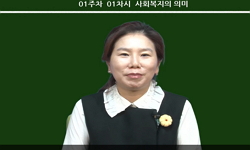There has been two different types of study on the Won-hyo`s philosophy of dispute-reconciliation(和諍). One type is to connect the thought of dispute-reconciliation with the whole system of Won-hyo`s philosophy indiscriminately, another type is to ...
http://chineseinput.net/에서 pinyin(병음)방식으로 중국어를 변환할 수 있습니다.
변환된 중국어를 복사하여 사용하시면 됩니다.
- 中文 을 입력하시려면 zhongwen을 입력하시고 space를누르시면됩니다.
- 北京 을 입력하시려면 beijing을 입력하시고 space를 누르시면 됩니다.

화쟁사상을 둘러싼 쟁점 검토 = An investigation of the disputed point concerning Won-hyo(元曉)`s philosophy of dispute-reconciliation(和諍)
한글로보기https://www.riss.kr/link?id=A99771309
- 저자
- 발행기관
- 학술지명
- 권호사항
-
발행연도
2013
-
작성언어
-
- 주제어
-
KDC
200
-
등재정보
KCI등재후보
-
자료형태
학술저널
-
수록면
125-170(46쪽)
-
KCI 피인용횟수
0
- 제공처
- 소장기관
-
0
상세조회 -
0
다운로드
부가정보
다국어 초록 (Multilingual Abstract)
There has been two different types of study on the Won-hyo`s philosophy of dispute-reconciliation(和諍). One type is to connect the thought of dispute-reconciliation with the whole system of Won-hyo`s philosophy indiscriminately, another type is to treat them discriminately. The type of connecting the philosophy of dispute-reconciliation with the whole system of Won-hyo`s philosophy indiscriminately expands the category and meaning of the word dispute-reconciliation(和諍)` too much, thus deviates from the actual category and problem of dispute-reconciliation(和諍). ‘Dispute-reconciliation(和諍)’ is the word that has the desire to solve the concrete disputes, and Won-hyo must have to use the word with this meaning. The category of the philosophy of dispute-reconciliation(和諍) is the different understandings on the Buddhist theories, and the object of dispute-reconciliation(和諍) is the situation of exclusive confrontation and conflict and non-communication caused by it. The disagreement between ex-school of Yogacara(舊唯識) and neo-school of Yogacara(新唯識), and the confrontation of emptiness(空)·existence(有) of Madhyamaka(中觀)·Yogacara(唯識) cannot be regarded as the object of Won-hyo`s dispute-reconciliation(和諍). In order to understand the composition-principle of Won-hyo`s dispute-reconciliation argument(和諍論法), the contents and meaning of the source of dispute-reconciliation`s logic must be elucidated in detail. The source of dispute-reconciliation`s logic is to develop the capability to grasp the boundary line for the appropriate discrimination and decision of affirmation or negation. If Won-hyo`s dispute-reconciliation argument(和諍論法) is to be founded on that source, his dispute-reconciliation argument(和諍論法) could not only have the healing capability on the Buddhist disputes but have the universal capability of healing on mundane disputes. The research on Won-hyo`s dispute-reconciliation argument(和諍論法) hereafter needs to concentrate on this subject. Subject : Buddhist Philosophy, Philosophy of Won-hyo`s dispute-reconciliation
참고문헌 (Reference)
1 이도흠, "화쟁 철학과 탈현대 철학의 비교연구" 3 : 2009
2 최연식, "원효의 화쟁사상의 논의방식과 사상사적 의미" 보조사상연구원 (25) : 405-462, 2006
3 박재현, "원효의 화쟁사상에 대한 再考 -화쟁의 소통(疏通)적 맥락" (8) : 2001
4 이기영, "원효의 화쟁사상과 오늘의 통일문제" 한국불교연구원 2 : 2001
5 김형효, "원효에서 다산까지" 청계 2000
6 박태원, "원효 화쟁사상의 보편 원리" 새한철학회 4 (4): 2004
7 이종익, "원효" 예문서원 2002
8 박성배, "원효" 예문서원 2002
9 남동신, "동아시아불교와 원효의 화쟁사상" 원효학회 10 : 2005
10 이효걸, "元曉의 和諍思想에 대한 재검토" 불교학연구회 4 : 1-34, 2002
1 이도흠, "화쟁 철학과 탈현대 철학의 비교연구" 3 : 2009
2 최연식, "원효의 화쟁사상의 논의방식과 사상사적 의미" 보조사상연구원 (25) : 405-462, 2006
3 박재현, "원효의 화쟁사상에 대한 再考 -화쟁의 소통(疏通)적 맥락" (8) : 2001
4 이기영, "원효의 화쟁사상과 오늘의 통일문제" 한국불교연구원 2 : 2001
5 김형효, "원효에서 다산까지" 청계 2000
6 박태원, "원효 화쟁사상의 보편 원리" 새한철학회 4 (4): 2004
7 이종익, "원효" 예문서원 2002
8 박성배, "원효" 예문서원 2002
9 남동신, "동아시아불교와 원효의 화쟁사상" 원효학회 10 : 2005
10 이효걸, "元曉의 和諍思想에 대한 재검토" 불교학연구회 4 : 1-34, 2002
동일학술지(권/호) 다른 논문
-
분황 원효 저술의 서지학적 검토 -교판(敎判)인식(認識)과 학문(學問)방법(方法)과의 관련을 중심으로 -
- 한국불교사학회 한국불교사연구소
- 고영섭 ( Young Seop Ko )
- 2013
- KCI등재후보
-
- 한국불교사학회 한국불교사연구소
- 이도흠 ( Do Heum Lee )
- 2013
- KCI등재후보
-
- 한국불교사학회 한국불교사연구소
- 김원명 ( Won Myoung Kim )
- 2013
- KCI등재후보
-
- 한국불교사학회 한국불교사연구소
- 한명기 ( Myung Gi Han )
- 2013
- KCI등재후보




 KISS
KISS








